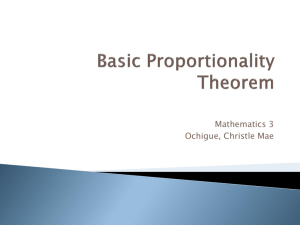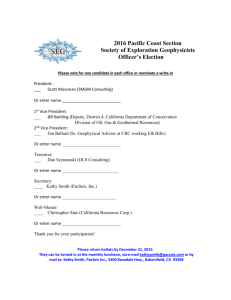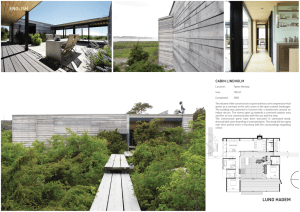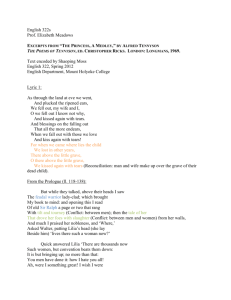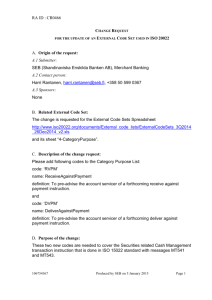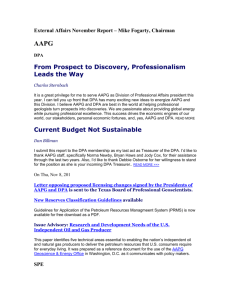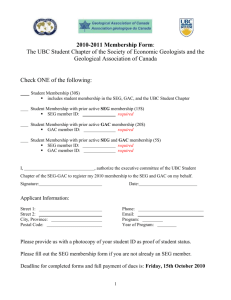Effects of Music on Physiological Arousal
advertisement
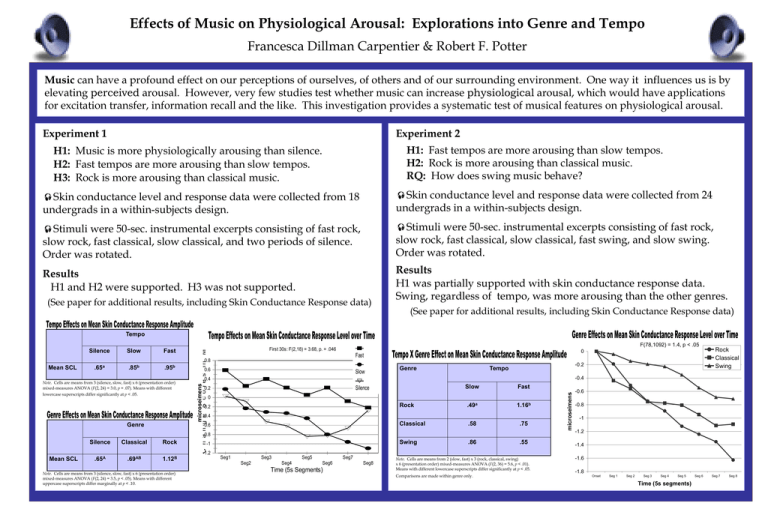
Effects of Music on Physiological Arousal: Explorations into Genre and Tempo Francesca Dillman Carpentier & Robert F. Potter Music can have a profound effect on our perceptions of ourselves, of others and of our surrounding environment. One way it influences us is by elevating perceived arousal. However, very few studies test whether music can increase physiological arousal, which would have applications for excitation transfer, information recall and the like. This investigation provides a systematic test of musical features on physiological arousal. Experiment 1 Experiment 2 H1: Fast tempos are more arousing than slow tempos. H2: Rock is more arousing than classical music. RQ: How does swing music behave? H1: Music is more physiologically arousing than silence. H2: Fast tempos are more arousing than slow tempos. H3: Rock is more arousing than classical music. Stimuli were 50-sec. instrumental excerpts consisting of fast rock, slow rock, fast classical, slow classical, and two periods of silence. Order was rotated. Stimuli were 50-sec. instrumental excerpts consisting of fast rock, slow rock, fast classical, slow classical, fast swing, and slow swing. Order was rotated. Results H1 and H2 were supported. H3 was not supported. Results H1 was partially supported with skin conductance response data. 0 Swing, regardless of tempo, was more arousing than the other genres. M ic r o S ie m e n s Skin conductance level and response data were collected from 24 undergrads in a within-subjects design. (See paper for additional results, including Skin Conductance Response data) Fast in 0.6 0 .85b .95b Note. Cells are means from 3 (silence, slow, fast) x 6 (presentation order) mixed-measures ANOVA (F(2, 24) = 3.0, p = .07). Means with different lowercase superscripts differ significantly at p < .05. First 30s: F(2,18) = 3.68, p. = .046 0.2 Fast 0 Slow -0.4 0.4 -0.6 -0.6 0.2 Silence -0.8 -0.8 0 Genre Fast Rock Classical Rock Slow Swing -1 -0.2 -1 -1.2 -0.4 -1.2 -0.6 Genre Effect of Music Pacing on Arousal 0.4 -0.4 -0.2 0.6 microseimens C h a n g e S c o re s .65a in -0.2 0.8 Mean SCL -0.4 Seg1 Seg3 Seg5 Seg2 Seg4 Seg8 Classical Silence Time (5s Segments) Mean SCL Classical Rock .65A .69AB 1.12B -1 -1.6 -1.2 Tempo -1 -0.2 Fast .49a 1.16b -1.6 .58 -1.8 Swing Seg1 -1.8 Seg3 Seg2 Seg 1 Seg5 Seg4 Seg 2 Seg 3 Seg 4 Seg7 Seg6 Seg 5 Time (5s Segments) Time (5s segments) Seg 6 Seg8 Seg 7 Seg 8 .86 .75 .55 Note. Cells are means from 2 (slow, fast) x 3 (rock, classical, swing) x 6 (presentation order) mixed-measures ANOVA (F(2, 36) = 5.6, p < .01). Means with different lowercase superscripts differ significantly at p < .05. Comparisons are made within genre only. Rock Classical Swing -0.4 -1.2 Onset Onset Note. Cells are means from 3 (silence, slow, fast) x 6 (presentation order) mixed-measures ANOVA (F(2, 24) = 3.5, p < .05). Means with different uppercase superscripts differ marginally at p < .10. 0 -1.4 -0.8 -1.4 Silence F(78,1092) = 1.4, p < .05 -0.8 Slow Seg7 Seg6 -0.6 microseimens Slow First 30s: F(2,18) = 3.68, p. = .046 0.8 S c o re s Silence (See paper for additional results, including Skin Conductance Response data) Effect of Music Pacing on Arousal C h a n g e Tempo -0.2 microseimens M ic r o S ie m e n s Skin conductance level and response data were collected from 18 undergrads in a within-subjects design. Seg 1 -0.6 Rock Classi Swing -0.8 -1 Seg 2-1.2 Seg 3 Seg 4 Seg 5 Seg 6 Seg 7 Seg 8 Time (5s segments) -1.4 -1.6 -1.8 Onset Seg 1 Seg 2 Seg 3 Seg 4 Seg 5 Time (5s segments) Seg 6 Seg 7 Seg 8
